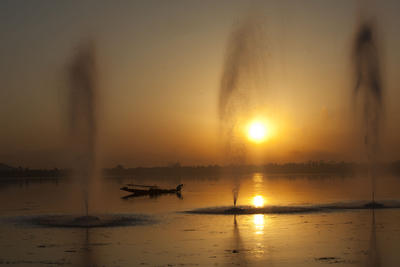The complex nature of water interactions is not well understood, and discussions of hydro-politics are disproportionately focused on regions of the world where conflict outweighs cooperation or where water scarcity is a stress multiplier in other forms of social unrest. This distorts our understanding of how positive-sum outcomes can be achieved — or how tensions can develop in water interactions that have seemingly a lot of potential for cooperation.
A case in point is the dispute between India and Nepal over the development and sale of Himalayan hydropower, a situation that could, and arguably should, be mutually beneficial to both countries. The puzzle of why this is such a tense relationship is highlighted when seen in contrast to the highly cooperative water interactions between India and the other Himalayan kingdom, Bhutan.
India’s rapid population and economic growth is increasing demand for energy at a rate faster than current capacity can provide. Part of India’s energy shortfall can be addressed through domestic hydropower-generation, but India is also seeking its energy security in the Himalayas, and the vast hydropower potential of Nepal and Bhutan. Both are poor, landlocked countries with their upstream, water-abundant, mountainous geography providing vast potential for hydropower generation.
This hydropower potential remains largely untapped, although India has been funding the construction of dams in Nepal since the middle of the last century, and in Bhutan for several decades. Selling hydropower on the Indian market could partly satisfy India’s energy demand and have the positive-sum outcome of significantly boosting Nepal’s and Bhutan’s GDPs. These mutual benefits, however, have only manifested in the case of Bhutan, while the water interactions between Nepal and India remain mired in tensions, and cooperation is often stifled.
The interests of India and Nepal in regards to Himalayan hydropower development are not mutually exclusive. Yet Nepal, unlike Bhutan, has not been able to deal with India in a way that engenders non-zero-sum thinking. Bhutan is a stable, culturally homogenous state that has negotiated terms of trade that allow it to prosper socially and economically. In contrast, Nepal is a volatile, socially and politically fragmented country that has experienced a number of domestic factors that impede its relationship with India.
Nepal continues to feel cheated over existing hydropower project deals with India, even ones dating as far back as the 1950s, and the bitterness generated by these experiences has coloured all subsequent water interactions between the two countries. At the same time, development of hydropower capacity is also a secondary political priority because Nepal is caught up in a cycle of instability and violence, making security a more urgent consideration for the government.
Further stifling Nepal’s ability to capitalise on its hydropower potential is the country’s dependency on foreign aid. This is inhibiting political will for the proactive pursuit of positive-sum outcomes by creating a sense of entitlement and expectations of foreign solutions to domestic problems. Furthermore, indigenous ethnic groups are upholding their right to control the resources in their areas, meaning no central government can decide on a project without their prior and informed consent. Civil society opposition to dam building, mostly on environmental grounds, provides yet another obstacle to Nepal engaging with India on future hydropower projects that could bring about mutual benefits.
Juxtaposed with the complexity of Nepal’s domestic issues is the alignment of Bhutan’s interests regarding the sale of hydropower to India. This arrangement is positive-sum and the export revenue is not only a major source of GDP but has also fuelled remarkable socio-economic growth in Bhutan. Indeed, the kingdom is planning to continue increasing its hydropower capacity in order to reap further benefits, such as shifting the national energy mix away from timber to electricity in order to reduce the rate of deforestation. This accords well with Bhutan’s position on balancing the environmental, social, cultural and economic value and uses of water, as well as taking a whole-of-basin approach to transboundary water resource management. The question remains, however, how the application of Gross National Happiness principles will fare against the increasing temptations of modernisation and development.
These two cases illustrate that water conflict and tensions in water interactions can develop anywhere, even in situations where the interests of the states involved seem to align. An alignment of interests is a necessary but not sufficient condition for meaningful cooperation. Many other factors, such as domestic cohesion, levels of trust among actors, and the effects of power asymmetry between them, contribute to the balance of conflict and cooperation that defines every relationship. Understanding this is the key to moving beyond the misleadingly simplistic notion of water wars.
Paula Hanasz is a PhD candidate at the Crawford School of Public Policy, Australian National University.


This should be a decision in which both companies participate and not fight. The Himalayas are at both ends. Electricity is also needed at both ends; it’s only that India has got a large population